Uncover ancient tales of love, betrayal, and faith in biblical marriages, revealing timeless wisdom for modern relationships.
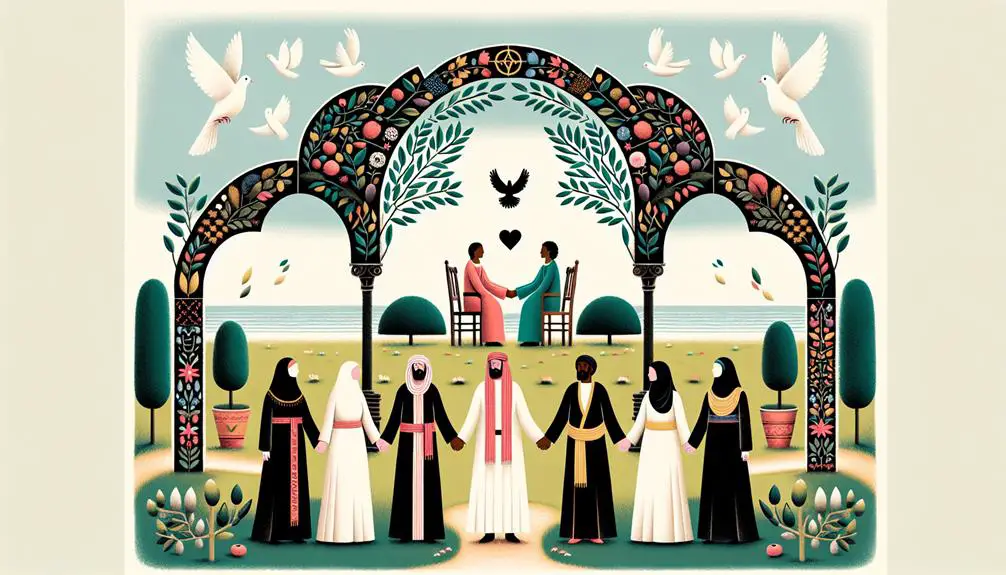
Examples of Marriage in the Bible
From the first couple in Eden's garden to partnerships that shaped the early church, marriage in the Bible is as varied as the sands along the seashore.
You'll find tales of loyalty, betrayal, love, and sacrifice. Consider Abraham and Sarah's journey, a testament to faith and patience, or Isaac and Rebekah's story, where divine intervention leads to a lifelong partnership.
These narratives aren't just ancient history; they offer insights into the complexities of relationships and faith's role within them. Uncover the layers within these stories, and you might just find timeless wisdom applicable to modern-day relationships.
Why not explore these tales further to discover what they reveal about enduring partnerships?
Key Takeaways
- Biblical marriages often illustrate faith, divine promises, and the significance of covenants between individuals and God.
- They explore complex family dynamics, including love, rivalry, and societal norms, through stories like Jacob, Rachel, and Leah.
- Marriages in the Bible reflect cultural customs and divine intervention, highlighting the importance of bridal dowry and marrying within one's faith.
- Examples like Boaz and Ruth, and Aquila and Priscilla, showcase loyalty, redemption, and partnership in ministry, embodying virtues essential for marital success.
Adam and Eve: Humanity's First Couple
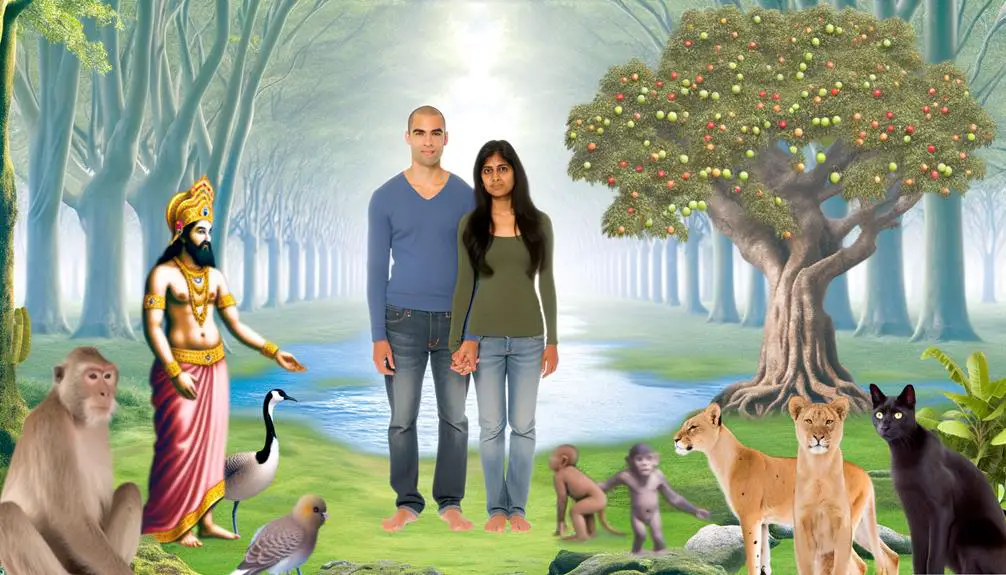
Adam and Eve, humanity's inaugural couple, serve as the biblical archetype for marriage, embodying its foundational aspects within a divine context. Their story, deeply rooted in the Genesis narrative, provides not only the blueprint for marital union but also introduces the concept of Original Sin, which has profound theological implications for understanding human nature and relationships.
You'll find that in the tranquility of Garden Living, Adam and Eve's relationship was initially marked by harmony and direct communion with God. This idyllic existence underscores the intended divine order and the inherent goodness of creation, including the institution of marriage. However, the entry of sin through their disobedience disrupts this order, casting a long shadow over their relationship and, by extension, all subsequent human relationships.
The narrative of Original Sin is critical in analyzing the dynamics of Adam and Eve's relationship. It illustrates how sin introduced elements of blame, shame, and discord into the marriage, fundamentally altering the way they relate to each other and to God. This pivotal event not only marks the loss of innocence but also serves as a turning point, highlighting the complexities and challenges inherent in human relationships post-fall.
In this context, their story transcends the historical or mythological, offering deep insights into the nature of marital relationships. It reflects on the vulnerabilities and struggles that couples face, emphasizing the need for mutual understanding, forgiveness, and the grace to overcome the imperfections introduced by sin.
Thus, Adam and Eve's narrative, with its themes of Original Sin and Garden Living, remains profoundly relevant. It offers a lens through which to explore the intricacies of marriage, underscoring the mixture of beauty and brokenness that characterizes human relationships in a post-Edenic world.
Abraham and Sarah: A Journey of Faith

As you explore the narrative of Abraham and Sarah, you'll uncover a profound exploration of faith amid challenges and the realization of promises fulfilled. Their story exemplifies how unwavering belief and patience are rewarded, even when faced with seemingly insurmountable obstacles.
This account not only enriches our understanding of biblical marriage dynamics but also offers insights into the complexities of faith and commitment.
Faith Amid Challenges
The narrative of Abraham and Sarah epitomizes the embodiment of steadfast faith amidst formidable challenges, illustrating a profound journey of belief and trust in divine promises. Their story, deeply embedded within the tapestry of marital commitment, showcases how marriage vows serve not only as a covenant between individuals but also as a foundation for overcoming adversity. Through their experiences, Abraham and Sarah exemplify conflict resolution rooted in faith, navigating uncertainties and trials with unwavering belief in each other and in divine guidance.
This journey underscores the pivotal role of mutual support and trust in facing life's challenges. As they confront obstacles, their story becomes a testament to the power of faith to sustain a partnership through the most daunting of times.
Promises Fulfilled
In their journey of faith, Abraham and Sarah witnessed the realization of divine promises, marking a pivotal moment in their lives and in the broader narrative of biblical faithfulness. This triumphant fulfillment wasn't just a personal victory; it underscored the covenant significance between God and His people.
The vow renewal, implicit in God's faithful provision, wasn't merely about land or progeny but about establishing a legacy of faith that would ripple through generations. This narrative invites you to ponder the depth of trust and patience required in the walk of faith.
It's a scholarly reminder that covenants with the Divine aren't static contracts but dynamic, living commitments that evolve with time, testing, and ultimately, through divine fulfillment.
Isaac and Rebekah: A Match Made by God

You'll find that Isaac and Rebekah's union exemplifies divine intervention and the essence of love at first sight within a biblical context.
This narrative underscores how faith and providence play pivotal roles in their coming together, as orchestrated by a higher power.
Analyzing their story offers insights into the spiritual dimensions that guide marital matches in biblical teachings.
Divine Intervention
Why does the story of Isaac and Rebekah stand as a quintessential example of divine intervention in matrimonial unions within biblical narratives?
This union encapsulates celestial matchmaking and garners heavenly approvals, marking it as a foundational tale of divine orchestration in marriage. Here's why:
- Guided by Prayer: Abraham's servant prays for guidance to find the right wife for Isaac, highlighting reliance on divine will in the selection process.
- Signs from Above: The servant's prayer is answered through specific signs, ensuring Rebekah is the chosen one, which underscores the concept of heavenly approvals in matrimonial choices.
- Fulfillment of Divine Promise: Their marriage furthers Abraham's lineage, as promised by God, showcasing celestial matchmaking's pivotal role in fulfilling divine covenants.
This narrative underscores the belief in divine providence guiding marital unions, setting a precedent for faith-led matrimonial choices.
Love's First Meeting
The initial encounter between Isaac and Rebekah epitomizes a divinely arranged meeting, meticulously orchestrated to align with God's broader plan for His people. This narrative not only unfolds the courtship traditions of the time but also subtly introduces romantic expressions within a context of faith and obedience.
Aspect |
Description |
Biblical Context |
|---|---|---|
Courtship |
Initiated by a family member, reflecting societal norms. |
Abraham sends his servant. |
Divine Guidance |
Prayer and providence play critical roles. |
Servant prays for guidance. |
Romantic Expression |
Rebekah's willingness signifies mutual respect. |
Watering camels as a sign. |
Marital Union |
Seen as part of God's plan for His people. |
Isaac marries Rebekah. |
Analyzing this foundational story, you'll recognize the balance between divine sovereignty and human responsibility in forming relationships that honor God.
Jacob, Rachel, and Leah: Love and Family Dynamics
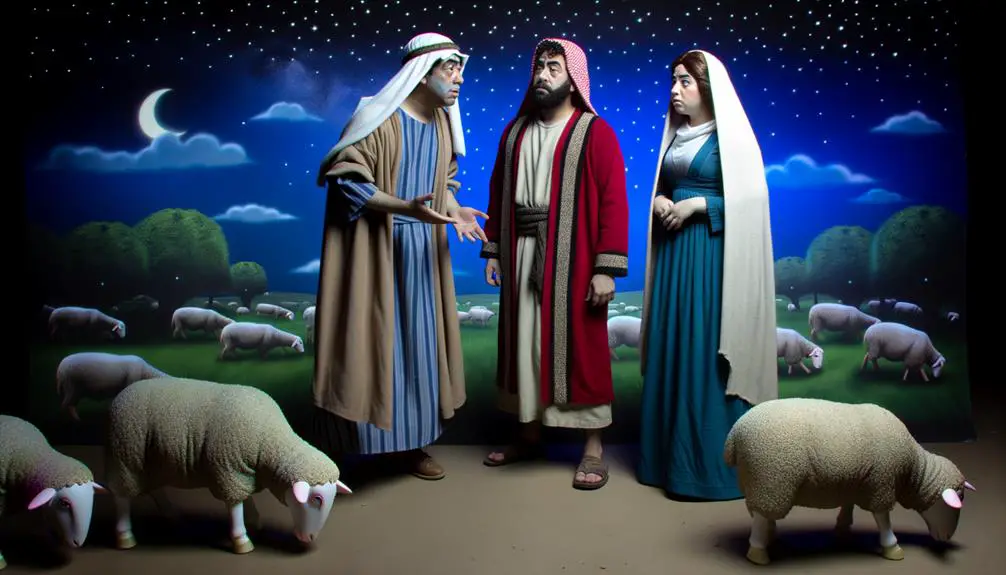
In examining the complex dynamics of love and family within the biblical narrative, one finds the story of Jacob, Rachel, and Leah to be a profound illustration of the interplay between human desires, divine intervention, and societal norms. This tale, rooted in the heart of Genesis, reveals much about the nature of relationships and the forces that shape them.
Central to this narrative are:
- Sibling Rivalry: The competition between Rachel and Leah goes beyond mere sibling discord, reflecting deep-seated issues of love, worth, and societal validation. Leah's unloved status, contrasted with Rachel's favored one, showcases the emotional and psychological complexities within familial bonds.
- Cultural Customs: The practice of marrying multiple women, particularly sisters, and the concept of a bridal dowry or service as seen in Jacob's fourteen years of labor, highlight the influence of cultural norms on personal relationships. These customs not only dictate the terms of marriage but also affect the interpersonal dynamics within the household.
- Divine Intervention: Despite human plans, it's evident that divine will plays a crucial role in the unfolding of events. The births of the twelve tribes of Israel from Leah, Rachel, and their maidservants signify a broader divine narrative at work, intertwining personal desires and God's larger plan.
Analyzing the story of Jacob, Rachel, and Leah offers insights into the complexities of love, the impact of societal expectations, and the omnipresence of divine orchestration. It's a testament to the multifaceted nature of human relationships, shaped by internal desires, social norms, and a higher divine purpose.
Boaz and Ruth: Loyalty and Redemption
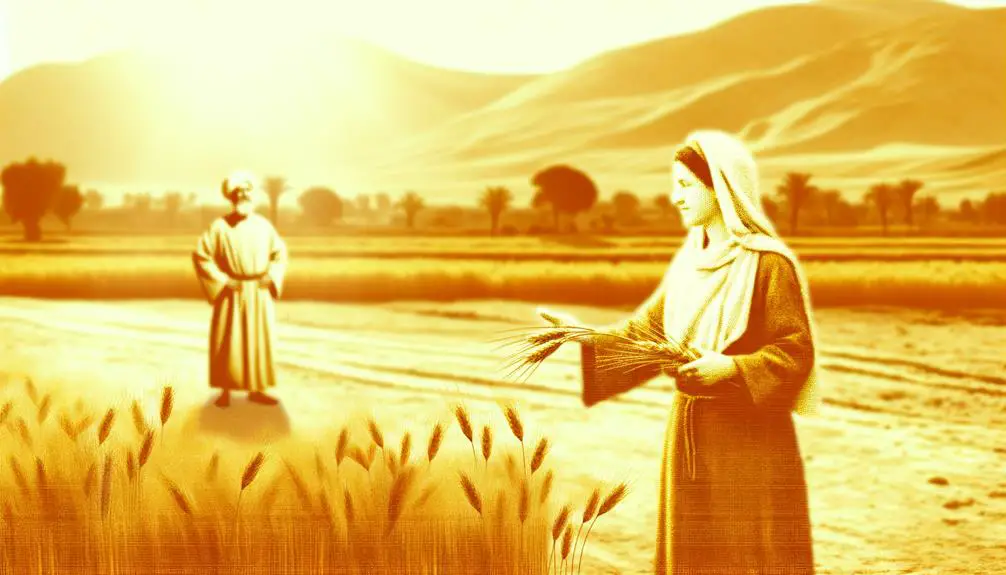
Exploring further into the biblical narratives of love and commitment, we encounter the compelling story of Boaz and Ruth, a testament to the enduring virtues of loyalty and redemption within the tapestry of human relationships. In this tale, you're invited to delve into the cultural norms and harvest significance pivotal to understanding their union.
Ruth's unwavering loyalty to Naomi, her mother-in-law, sets the stage for her meeting with Boaz during the harvest season, a time of great significance in ancient agrarian societies. This period symbolizes not just physical reaping but also spiritual and relational harvests, reflecting the providential care of God for His people.
The cultural norms of the time, including the practice of leveraged marriage (Yibbum) and gleaning rights for the poor, frame their story. Boaz, recognizing Ruth's loyalty and her adherence to cultural and moral expectations, acts as a redeemer, marrying her in a move that not only secures Ruth and Naomi's future but also aligns with the broader themes of restoration and divine providence in the biblical narrative.
Aspect |
Significance |
|---|---|
Harvest |
Symbolizes reaping of rewards, both physical and spiritual, highlighting God's provision. |
Cultural Norms |
Provide the framework within which the story of loyalty and redemption unfolds. |
This narrative doesn't just recount a personal story of love and redemption; it invites you to ponder the deeper meanings of loyalty, societal obligations, and divine orchestration within the context of human relationships.
Aquila and Priscilla: Partners in Ministry
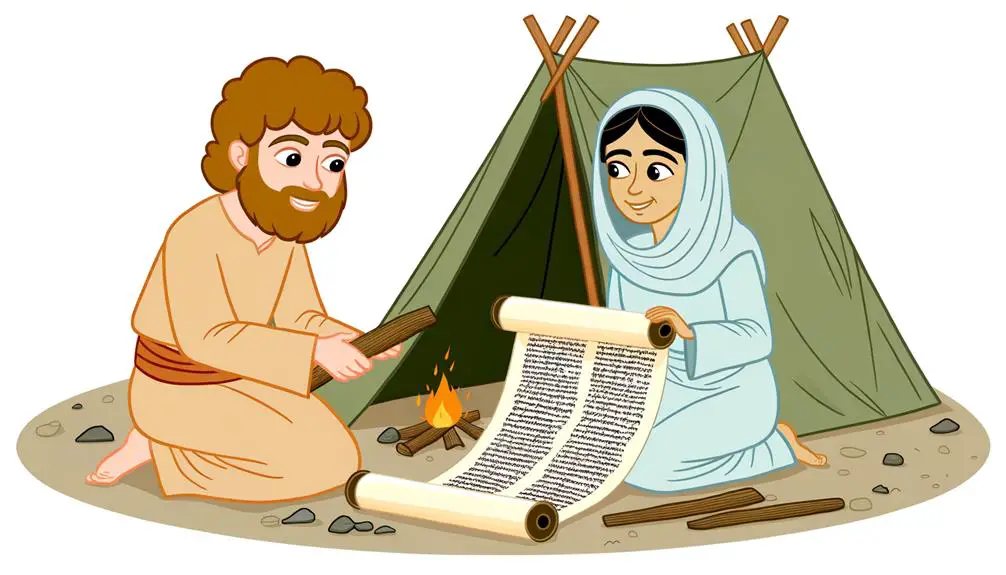
Aquila and Priscilla emerge as pivotal figures in the New Testament, exemplifying the profound impact of partnership in ministry on early Christian communities. Their story unfolds across several passages, revealing a couple deeply embedded in the fabric of the early church, not just as supporters but as active participants and leaders. Their roles extend beyond the domestic sphere, challenging contemporary norms and setting a precedent for marital collaboration in religious endeavors.
- Tent Making as a Ministry Platform: Aquila and Priscilla were tent makers by trade, a detail that might seem mundane at first glance. However, this vocation served as more than just a means of livelihood; it was a ministry platform. By sharing this trade with the Apostle Paul, they created a space where work, life, and faith intersected, allowing them to minister to those within and outside the Christian community.
- Mentoring Early Missionaries: Their home became a hub for teaching and mentoring early missionaries. The couple's ability to instruct and guide, as seen in their interaction with Apollos, highlights their significant role in the theological education and spiritual formation of early church leaders. This mentoring process was crucial for the expansion and doctrinal integrity of the Christian movement.
- Equal Partnership in Ministry: The consistent mention of Priscilla alongside Aquila in the scriptures underscores the notion of equal partnership in ministry, a progressive concept for the time. Their example illustrates how marital partners can serve side by side, each contributing their unique gifts to the furtherance of the Gospel.
Through tent making, mentoring, and equal partnership, Aquila and Priscilla exemplify the dynamic role couples can play in ministry, shaping the early Christian landscape and offering a timeless model for collaborative service.
Frequently Asked Questions
How Did Cultural Practices Influence the Concept of Marriage in Biblical Times, and How Does This Differ From Contemporary Understandings of Marriage?
In biblical times, cultural practices deeply shaped marriage, integrating social, religious, and economic aspects distinct from today's perceptions. Unlike modern ceremonies, which often emphasize love and personal choice, ancient unions prioritized alliances and inheritance.
Legal evolutions have since transformed marriage, introducing concepts of mutual consent and equal partnership. This shift reflects broader societal changes, moving away from the historical norms that once defined these pivotal relationships.
What Role Did Polygamy Play in the Biblical Understanding of Marriage, and How Is It Addressed in the Context of the Characters Mentioned in the Article?
You're opening a can of worms when you dive into how polygamy shaped biblical marriage.
Unlike today's norm of modern monogamy, polygamy's legality in ancient texts reflected societal norms and values. It significantly influenced characters' lives, highlighting the contrast between past and present marital practices.
This exploration offers a scholarly lens, shedding light on the evolution from polygamy to monogamy, and underscores the shift in marriage's conceptual framework over millennia.
How Are the Challenges and Conflicts Within These Biblical Marriages Addressed, and What Lessons Can Modern Couples Learn From Them?
When tackling challenges and conflicts in relationships, it's essential to focus on conflict resolution and effective communication strategies. By analyzing these issues without specific biblical examples, you can learn the importance of open dialogue and understanding in overcoming obstacles.
Modern couples can take away the need for patience, active listening, and empathy in their relationships, ensuring that both partners feel heard and valued, thereby fostering a healthier, stronger bond.
In What Ways Did Women Exert Influence or Power Within Their Marriages in Biblical Narratives, Despite the Patriarchal Context?
In a world where men seemingly held the reins, women in biblical narratives subtly wielded power and influence. Despite operating within a patriarchal framework, their roles weren't confined to the background.
Female prophets, like Deborah, showcased leadership and wisdom, guiding entire communities. Women negotiating land rights, as seen with the daughters of Zelophehad, broke societal norms, paving the way for significant shifts in inheritance laws.
These stories underline a nuanced understanding of power dynamics.
How Do the Marriages in the Bible Reflect the Relationship Between God and Humanity, and What Theological Implications Can Be Drawn From These Examples?
You're exploring how marriages mirror the bond between God and humanity, delving into covenant symbolism and divine metaphor.
This analysis reveals theological depths, showing marriages as more than social contracts; they're spiritual allegories. These unions reflect God's unwavering commitment to His people, embodying love, fidelity, and grace.
Through this lens, you understand the profound implications of divine-human relationships, offering insights into the nature of God's covenant with humanity.
Conclusion
As we've traipsed through these biblical matrimonial halls, it's clear that marriage, with its divine matchmaking and complex family trees, isn't just a walk in Eden's park.
From Adam and Eve's apple debacle to Aquila and Priscilla's ministry tag team, these narratives aren't just ancient gossip; they're lessons in love, faith, and sometimes, the art of dealing with in-laws who literally wrestle with angels.
So, as you navigate your love life, remember, it's biblical to expect the unexpected.

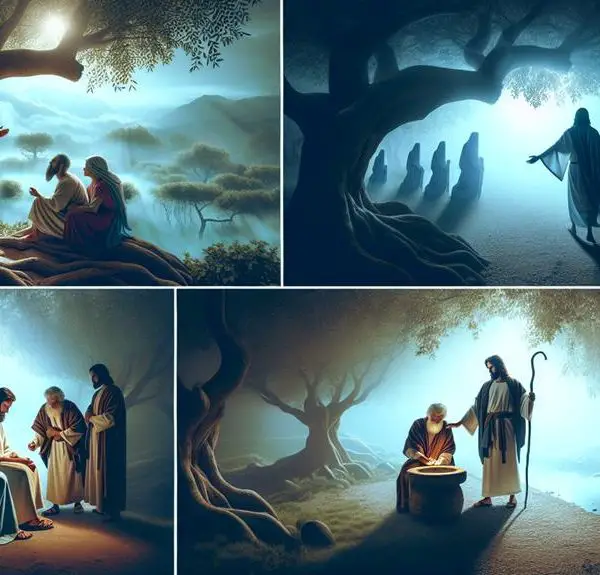
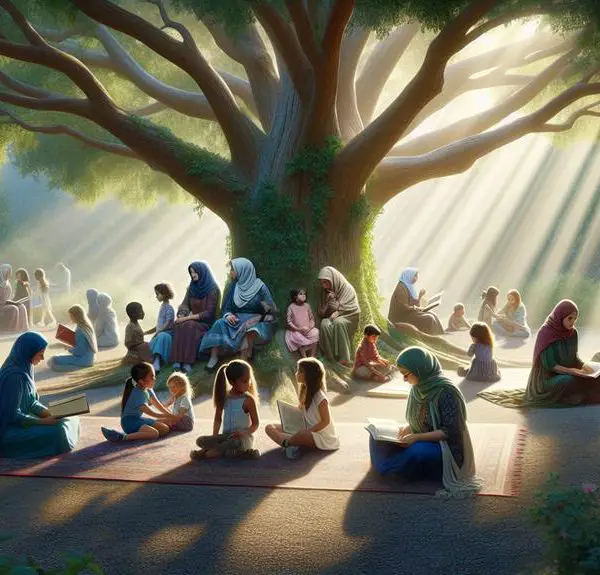
Sign up